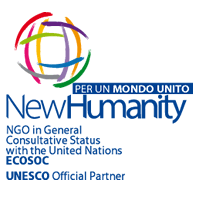Golden Rule
 A mosaic located at the entrance of the United Nations Secretariat Building in New York depicts people of different nationalities, religions, and cultures with the words: “Do unto others as you would have them do unto you”, the so called Golden Rule, inscribed on its surface.
A mosaic located at the entrance of the United Nations Secretariat Building in New York depicts people of different nationalities, religions, and cultures with the words: “Do unto others as you would have them do unto you”, the so called Golden Rule, inscribed on its surface.
But what exactly is the Golden Rule? It is a unique law because “it expresses a formidable intuition that is accessible to human knowledge and conscience”[1], in that is part of all the main religions and schools of thought of the world. As a consequence it can also be described as the core of universal ethical codes. According to recent studies, it was mentioned as early as 3,000 BC in the vedic Indian tradition: “Don't do unto others what you don't want done unto you; wish for others what you wish for yourself”[2].
Among the oldest golden rule quotes we can find those from the philosopher Confucius, who lived in China between the sixth and fifth century BC.
As for Judaism, we can read the Golden Rule for the first time in the Book of Tobias, dated 200 BC, but Jesus Christ has turned it into a positive sentence: “Do unto others as you would have them do unto you”.[3]
During the Middle Ages, the rule was included in the Rule of Saint Benedict[4] and in the Regola non bollata of Saint Francis of Assisi[5].
Golden Rule in religion and culture
We have already mentioned that one of the more interesting characteristics of the Golden rule is that it can be found inside all the main religions, schools of though, and philosophies everywhere in the world and in all time periods. We want to mention a few in alphabetical order.
Baha’ì: “Blessed is who prefers his brother to himself” (Bahà’u’llàh tablets – 19th century).
Buddhism: “Whatever is disagreeable to yourself, do not do unto others” (The Buddha, Udana-Varga 5.18 – 6th century BC).
Confucianism: “Do not do to others what you do not want them to do to you” (Confucius, Analects 15.23 – 5th century BC).
Christianity: “You shall love your neighbour as yourself. On these two commandments depend all the Law and the Prophets.” (Gospel of Matthew 22, 36-40 – 1st century CE).
Judaism: “What is hateful to you, do not do to your fellow-man. This is the entire Law, all the rest is commentary” (Talmud, Shabbat 3id – 16th century BC).
Gandhi: “To see the universal and all-pervading Spirit of Truth face to face, one must be able to love the meanest of all creation as oneself” (translated from: Il mio credo, il mio pensiero, Newton Compton, Rome 1992, page 70 – 20th century).
Jainism: “In happiness and sorrow, in joy and in pain, we should consider every creature as we consider ourselves” (Mahavira, 24th Tirthankara – 6th century BC).
Judaism: “Never do to anyone else anything that you would not want someone to do to you” (Tobias 4, 15 – 3rd century BC).
Hinduism: “This is the sum of duty. Do not unto others that which would cause you pain if done to you” (Mahabharata 5, 1517 – 15th century BC).
Islam: “None of you will believe until you love for your brother what you love for yourself” (Hadith 13, The Forty Hadith of Imam Nawawi – 7th century).
Native Americans: “Respect for every form of life is the foundation”(The Big Law of Peace– 16th century).
Plato: “I can do to others what I’d like them to do to me” (5th century BC).
Yoruba wise saying (West Africa): “If somebody stings a bird with a sharp stick, should be first try it on himself and realise how badly it hurts”.
Seneca: “Treat your inferiors as you would be treated by your betters” (Letter 47 11 – 1st century).
Shintoism: “Be charitable to all beings, love is the representation of God” (approximately 500 CE: Ko-ji-ki Hachiman Kasuga – 8th century BC)
Sikhism: “I am a stranger to no one, and no one is a stranger to me. Indeed, I am a friend to all” (Guru Granth Sahib, religious scripture of Sikhism, p. 1299 – 15th century).
Voltaire: “Put yourself in the other person's shoes” (Letters on the English, n.42).
Zoroastrianism: “Do not do to others what is harmful for yourself” (Shayast-na-Shayast 13, 29 – between 18 and 15 century BC).
The Golden Rule today
Come ricorda il filosofo Vigna, la regola d’oro “merita ai nostri tempi un’attenzione particolare, non è, in sé e per sé, una regola religiosa, ma una Regola “laica”.
Fetullah Gulen, sufi turco, ha fondato scuole e imprese in tutto il mondo nello spirito della regola d’oro.
Erich Fromm nel suo best-seller L’Arte di amare afferma: “Se io amassi veramente una persona, io amerei il mondo, amerei la vita.”[6]
Sorokin, sociologo russo, scrive: “Solo il potere dell’amore incondizionato provato per tutti gli esseri umani può sconfiggere le forze della lotta fratricida.”[7]
Chiara Lubich ha fatto della regola d’oro la regola fondante per costruire il “dialogo della vita”: “Bisogna spalancare il cuore, rompere tutti gli argini e mettersi in cuore la fratellanza universale! Se tutti siamo fratelli, dobbiamo amare tutti. Dobbiamo amare tutti. Sembra una parolina. È una rivoluzione.”[8]
In conclusione, allenandoci[9] insieme nei luoghi educativi e ovunque all’esercizio della regola d’oro, in continuità con le più antiche tradizioni culturali e religiose, potremo rispondere oggi alla necessità delle donne e degli uomini di ritrovarsi insieme in un percorso esistenziale nel quale la fraternità sia una scelta consapevole e condivisa.
____________________________________________
[1] T. Tatransky, Sul volume La Regola d’oro come etica universale, in , XXVIII (2006/5) 167, p.643.
[2] Mahabharata, Anusasana Parva 113.8.
[3] Cf. Lc 6, 31.
[4] La santa regola di san Benedetto, cap IV, v. 9.
[5] Regola non bollata (1221), cap. IV, v. 13.
[6] E. Fromm, L’arte di amare, Il Saggiatore, Milano 1978, p. 64.
[7] P.A. Sorokin, Il potere dell’amore, Città Nuova, Roma 2005, p.36.
[8] C. Lubich, L’arte di amare, Città Nuova, Roma 2005, p.30.
[9] “Applying properly the golden rule is basically a matter of competence: it is like serving in tennis” says Fanciullacci (T. Tatransky, in the book: La regola d’oro come etica universale, quote, p. 658).








